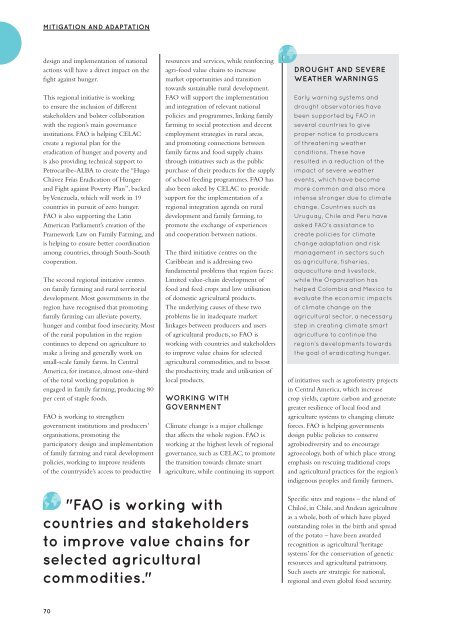Climate Action 2014-2015
Create successful ePaper yourself
Turn your PDF publications into a flip-book with our unique Google optimized e-Paper software.
MITIGATION AND ADAPTATION<br />
design and implementation of national<br />
actions will have a direct impact on the<br />
fight against hunger.<br />
This regional initiative is working<br />
to ensure the inclusion of different<br />
stakeholders and bolster collaboration<br />
with the region’s main governance<br />
institutions. FAO is helping CELAC<br />
create a regional plan for the<br />
eradication of hunger and poverty and<br />
is also providing technical support to<br />
Petrocaribe-ALBA to create the “Hugo<br />
Chávez Frías Eradication of Hunger<br />
and Fight against Poverty Plan”, backed<br />
by Venezuela, which will work in 19<br />
countries in pursuit of zero hunger.<br />
FAO is also supporting the Latin<br />
American Parliament’s creation of the<br />
Framework Law on Family Farming, and<br />
is helping to ensure better coordination<br />
among countries, through South-South<br />
cooperation.<br />
The second regional initiative centres<br />
on family farming and rural territorial<br />
development. Most governments in the<br />
region have recognised that promoting<br />
family farming can alleviate poverty,<br />
hunger and combat food insecurity. Most<br />
of the rural population in the region<br />
continues to depend on agriculture to<br />
make a living and generally work on<br />
small-scale family farms. In Central<br />
America, for instance, almost one-third<br />
of the total working population is<br />
engaged in family farming, producing 80<br />
per cent of staple foods.<br />
FAO is working to strengthen<br />
government institutions and producers’<br />
organisations, promoting the<br />
participatory design and implementation<br />
of family farming and rural development<br />
policies, working to improve residents<br />
of the countryside’s access to productive<br />
resources and services, while reinforcing<br />
agri-food value chains to increase<br />
market opportunities and transition<br />
towards sustainable rural development.<br />
FAO will support the implementation<br />
and integration of relevant national<br />
policies and programmes, linking family<br />
farming to social protection and decent<br />
employment strategies in rural areas,<br />
and promoting connections between<br />
family farms and food supply chains<br />
through initiatives such as the public<br />
purchase of their products for the supply<br />
of school feeding programmes. FAO has<br />
also been asked by CELAC to provide<br />
support for the implementation of a<br />
regional integration agenda on rural<br />
development and family farming, to<br />
promote the exchange of experiences<br />
and cooperation between nations.<br />
The third initiative centres on the<br />
Caribbean and is addressing two<br />
fundamental problems that region faces:<br />
Limited value-chain development of<br />
food and feed crops and low utilisation<br />
of domestic agricultural products.<br />
The underlying causes of these two<br />
problems lie in inadequate market<br />
linkages between producers and users<br />
of agricultural products, so FAO is<br />
working with countries and stakeholders<br />
to improve value chains for selected<br />
agricultural commodities, and to boost<br />
the productivity, trade and utilisation of<br />
local products.<br />
WORKING WITH<br />
GOVERNMENT<br />
<strong>Climate</strong> change is a major challenge<br />
that affects the whole region. FAO is<br />
working at the highest levels of regional<br />
governance, such as CELAC, to promote<br />
the transition towards climate smart<br />
agriculture, while continuing its support<br />
DROUGHT AND SEVERE<br />
WEATHER WARNINGS<br />
Early warning systems and<br />
drought observatories have<br />
been supported by FAO in<br />
several countries to give<br />
proper notice to producers<br />
of threatening weather<br />
conditions. These have<br />
resulted in a reduction of the<br />
impact of severe weather<br />
events, which have become<br />
more common and also more<br />
intense stronger due to climate<br />
change. Countries such as<br />
Uruguay, Chile and Peru have<br />
asked FAO’s assistance to<br />
create policies for climate<br />
change adaptation and risk<br />
management in sectors such<br />
as agriculture, fisheries,<br />
aquaculture and livestock,<br />
while the Organization has<br />
helped Colombia and Mexico to<br />
evaluate the economic impacts<br />
of climate change on the<br />
agricultural sector, a necessary<br />
step in creating climate smart<br />
agriculture to continue the<br />
region’s developments towards<br />
the goal of eradicating hunger.<br />
of initiatives such as agroforestry projects<br />
in Central America, which increase<br />
crop yields, capture carbon and generate<br />
greater resilience of local food and<br />
agriculture systems to changing climate<br />
forces. FAO is helping governments<br />
design public policies to conserve<br />
agrobiodiversity and to encourage<br />
agroecology, both of which place strong<br />
emphasis on rescuing traditional crops<br />
and agricultural practices for the region’s<br />
indigenous peoples and family farmers.<br />
"FAO is working with<br />
countries and stakeholders<br />
to improve value chains for<br />
selected agricultural<br />
commodities."<br />
Specific sites and regions – the island of<br />
Chiloé, in Chile, and Andean agriculture<br />
as a whole, both of which have played<br />
outstanding roles in the birth and spread<br />
of the potato – have been awarded<br />
recognition as agricultural ‘heritage<br />
systems’ for the conservation of genetic<br />
resources and agricultural patrimony.<br />
Such assets are strategic for national,<br />
regional and even global food security.<br />
70












